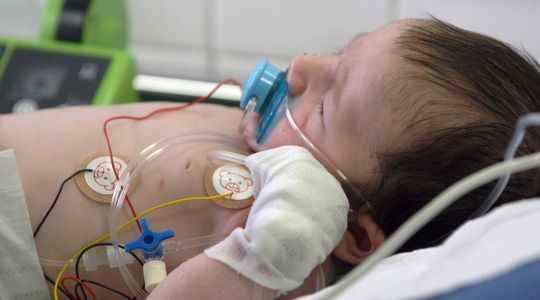Each year, bronchiolitis sweeps across the territory, strangling the pediatric services a little more. This respiratory disease, which affects babies and sometimes leads them to hospital, has now spread to almost all of France. The last few days have been marked by “a transition to the epidemic phase in eight new regions: Auvergne-Rhône-Alpes, Bourgogne-Franche-Comté, Brittany, Centre-Val de Loire, Grand Est, Guyana, Normandy and Pays de la Loire” , summarizes Public Health France during a weekly review published on October 19.
In mainland France, only Corsica and the Provence-Alpes-Côte d’Azur region are not ringing the alarm bell. Overseas France is, for the time being, less affected: Mayotte, Guadeloupe and Martinique remain in the pre-epidemic phase.
Common and highly contagious, bronchiolitis causes babies to cough and have difficult, rapid, wheezing breathing – symptoms can last up to ten days. Even if it is distressing for young parents, it is most of the time benign. In some cases, it may require a visit to the emergency room, or even hospitalization. According to data from Public Health France, bronchiolitis currently accounts for 13% of emergency room visits and 30% of hospitalizations for children under two years of age.
Compared to the previous week, the number of emergency visits for this disease increased by 46%. Among the 2,959 children under two years old who went to the emergency room for bronchiolitis in the week of October 10 to 16, 2,743 (93%) were under one year old; 973 (33%) were hospitalized. In the latter group, 935 (96%) were less than one year old.
Critical care services taken by storm
The number of hospitalizations is higher than what is usually observed at the beginning of October. This confirms the scenario of an earlier epidemic for the second year in a row. Generally, the first cases are declared at the end of October, the peak is reached at the end of December and the epidemic ends at the end of March. This year, according to Christèle Gras-Le Guen, president of the French pediatric society, the epidemic started “very quickly” and “very strongly”. A signal that is all the more worrying as this seasonal illness should still last six to eight weeks.
Newborns remain particularly vulnerable. In critical care wards, “most children” are under three months old and need machines to help them breathe. At the Nantes University Hospital, where Christèle Gras-Le Guen works, the hospital management has set up a crisis unit which meets weekly. The objective: to try to do the best with the means available. “Critical care services at the Nantes University Hospital are 130% occupied. Children are receiving oxygen in the hallways,” laments the pediatrician.
Due to lack of staff, many establishments have been forced to close beds. “In general pediatrics departments, we need one nurse for ten patients. Regarding critical care, the rule is one nurse for four children,” explains the specialist. If this ratio is not respected, the beds are closed. “At the Nantes University Hospital, we do not have closed beds because we already have very few,” says Christèle Gras-Le Guen, specifying that in Ile-de-France, certain services display “20% closure of beds”. In the Ile-de-France region, the director general of the regional health agency (ARS), Amélie Verdier, spoke on Thursday, October 20, of “high tensions” or even “very high tensions”.
Patients transferred
Already 14 young patients have had to be transferred outside Ile-de-France – to the University Hospitals of Amiens and Rouen in particular. At that of Nantes, Christèle Gras-Le Guen describes a similar situation where children were transferred to neighboring establishments, to Chateaubriand for example. But these hospitals are also likely to encounter difficulties in the days to come. The transfer of patients is far from being a satisfactory long-term solution. “Can you imagine the risk taking for children? We transport them in trucks when they are very badly and they find themselves a hundred kilometers from their parents’ home,” recalls the pediatrician.
Visiting a Parisian pediatric hospital on Friday, October 14, the Minister of Health had undertaken to “implement all means to respond to these peaks of activity linked to bronchiolitis”. For the moment, Public Health France recommends that parents (and their children) apply barrier gestures, wash their hands and wear a mask. For their part, the specialists remain suspended from the decisions of the government. “We are calling for help, but everyone remains indifferent. Our concern is that we cannot provide the children with the care they need”, concludes Christèle Gras-Le Guen.
